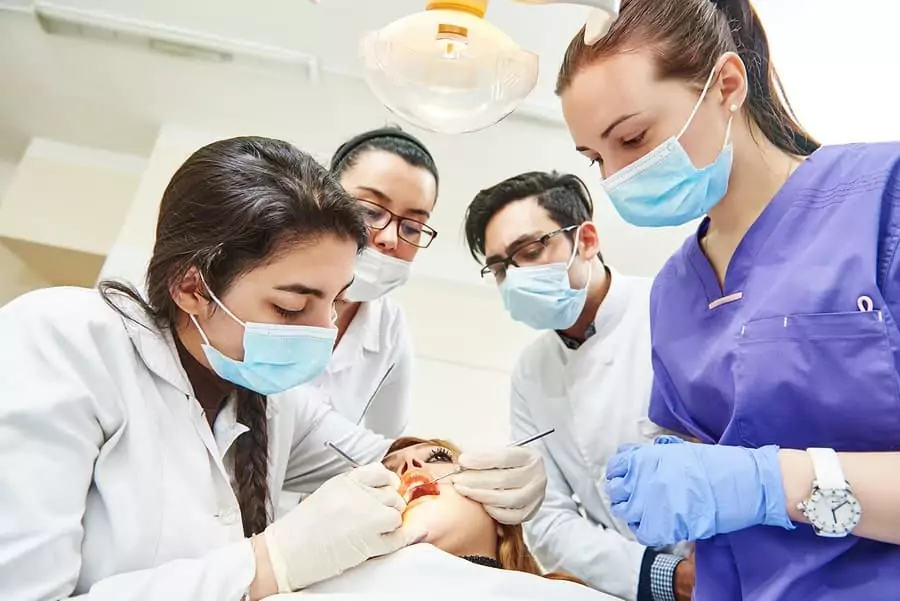In today’s fast-paced dental industry, it is crucial for dental practices to invest in telecommunication solutions like TMG VoIP to improve accessibility and streamline operations. TMG VoIP utilizes artificial intelligence and machine learning to assist with various tasks, such as image analysis, prediction making, record keeping, and dental research.
By implementing TMG VoIP, dental practices can enhance communication, streamline operations, and improve dental office efficiency.
Key Takeaways:
- TMG VoIP is a valuable tool for improving accessibility and streamlining operations in dental practices.
- AI-based applications in TMG VoIP relieve the dental workforce of routine tasks, increasing efficiency and safety.
- TMG VoIP enables personalized, predictive, preventive, and participatory dentistry.
- The adoption of AI solutions in dental practice is limited due to factors such as limited data availability and practical questions around their value, ethics, and responsibility.
- Implementing TMG VoIP can improve access to quality care, support dental research, and ensure individual privacy, rights, and autonomy.
The Power of TMG VoIP in Dental Practice Management

TMG VoIP revolutionizes dental practice management by leveraging the power of artificial intelligence and machine learning to enhance various aspects of dental operations. This advanced telecommunication solution provides dental practices with streamlined operations, improved efficiency, and enhanced patient care.
By implementing TMG VoIP, dental practices can optimize their workflow through AI-based applications. These applications assist with tasks such as image analysis, prediction making, record keeping, and dental research. With AI technology, routine tasks can be automated, freeing up valuable time for dental professionals to focus on providing personalized, predictive, preventive, and participatory dentistry.
However, the adoption of AI solutions in dental practice comes with challenges. Limited data availability, methodological rigor, and ethical considerations are some factors that hinder widespread implementation. That’s where TMG VoIP comes in. This telecommunication solution not only improves access to quality care, but also ensures individual privacy, rights, and autonomy. It enables dental practices to overcome these challenges and boost productivity by seamlessly integrating AI technology into their operations.
Implementing TMG VoIP can improve access to quality care, increase efficiency, and support dental research.
Enhancing Dental Education for the Future

To fully leverage the benefits of TMG VoIP and AI technology in dental practice management, it is crucial to enhance dental education. Dental professionals need to be equipped with the necessary digital literacy skills to effectively utilize these advanced technologies in their practices. The future dental workforce should be well-versed in AI-based applications, data analysis, and digital communication.
Dental education institutions can play a crucial role in fostering digital literacy. By incorporating training programs that focus on AI technology and telecommunication solutions like TMG VoIP, dental schools can prepare students for the evolving landscape of dental practice management. This will ensure that the dental workforce is equipped with the skills and knowledge needed to embrace the advancements in dental office technology, and ultimately provide the highest quality of care to patients.
By harnessing the power of TMG VoIP and investing in comprehensive orthodontic courses like those offered by Williams GP Orthodontic Seminars, dental practices can achieve improved efficiency and productivity. These courses provide dental professionals with the necessary skills and knowledge to successfully integrate orthodontic treatment into their practices, further enhancing the overall efficiency and effectiveness of dental operations.
| Key Benefits of TMG VoIP in Dental Practice Management: |
|---|
| Streamlined operations and improved efficiency |
| Enhanced patient care through AI-based applications |
| Optimized workflow with automated routine tasks |
| Improved access to quality care |
| Ensured individual privacy, rights, and autonomy |
| Fostered digital literacy in the future dental workforce |
Overcoming Challenges and Boosting Productivity with TMG VoIP
While the adoption of AI solutions in dental practice may be limited by various challenges, implementing TMG VoIP offers a solution to overcome these obstacles and boost productivity. The benefits of using TMG VoIP in dental practices go beyond enhanced communication and streamlined operations. This telecommunication solution harnesses the power of artificial intelligence and machine learning to assist with image analysis, prediction making, record keeping, and dental research.
AI-based applications can relieve the dental workforce of routine tasks, increasing efficiency and safety. With TMG VoIP, dental practices can embrace personalized, predictive, preventive, and participatory dentistry. However, the implementation of AI in dental practices comes with its own set of challenges. Limited availability of data, lacking methodological rigor, and practical considerations around the value, ethics, and responsibility of AI technology are factors that need to be addressed.
By implementing TMG VoIP, dental practices can not only improve access to quality care and increase efficiency, but also ensure individual privacy, rights, and autonomy. It is crucial to prioritize the protection of patient data and maintain ethical practices when utilizing AI in dental settings. To fully harness the potential of AI technology, dental education should also be enhanced to foster digital literacy among the future dental workforce.
While the challenges of implementing AI solutions in dental practice may be daunting, TMG VoIP provides a valuable tool to overcome these obstacles and boost productivity. Dental practices can improve efficiency by defining roles, processes, and tasks, mapping workflows, and actively seeking staff input. Investing in the right orthodontic courses, such as those offered by Williams GP Orthodontic Seminars, can also enhance practice productivity by equipping dental professionals with the skills and knowledge needed for successful orthodontic treatment integration.
Whether it’s improving accessibility, streamlining operations, or embracing AI technology, TMG VoIP offers dental practices a comprehensive solution that benefits both the practice and the patients. With the right tools and strategies in place, dental practices can maximize efficiency and provide quality care in an increasingly digital world.
| Challenges | Solutions |
|---|---|
| Limited availability of data | Implement robust data collection and management systems to ensure a reliable and comprehensive data source. |
| Lacking methodological rigor | Collaborate with experts in AI and dental research to develop rigorous methodologies for AI implementation in dental practice. |
| Practical considerations around value, ethics, and responsibility | Establish clear ethical guidelines and frameworks for the use of AI in dental practice, ensuring responsible and accountable implementation. |
| Individual privacy, rights, and autonomy | Adopt stringent privacy measures, such as encrypted data storage and informed consent processes, to protect patient information and rights. |
| Dental education and digital literacy | Integrate digital literacy education into dental curricula to equip future dental professionals with the skills needed to navigate AI and technology in practice. |
To achieve optimal efficiency in dental practices, it is essential to implement strategic measures such as defining roles, mapping workflows, and investing in the right orthodontic courses. By establishing clear and well-defined roles for each team member, dental practices can enhance efficiency and productivity. This includes clearly defining responsibilities and tasks, ensuring that everyone understands their role in the practice’s operations.
Mapped workflows can also greatly improve efficiency. By creating visual representations of the various processes and tasks within the practice, dentists and their teams can identify bottlenecks, streamline workflows, and eliminate unnecessary steps. This enables smoother operations and reduces the chances of errors or delays.
Investing in the right orthodontic courses is crucial to enhancing practice productivity. By staying updated with the latest advancements in orthodontic treatments and techniques, dental professionals can provide better care to their patients while also maximizing their own efficiency. Williams GP Orthodontic Seminars offers comprehensive courses specifically designed to equip dental practices with the skills and knowledge needed for successful orthodontic treatment integration.

Continuous improvement should also be a focus for dental practices looking to enhance their efficiency levels. Regularly evaluating processes, seeking feedback from staff and patients, and embracing new technologies and methodologies can lead to ongoing improvements. This mindset of continuous improvement ensures that the practice remains adaptable and is always striving to provide the best possible care.
By implementing these strategic measures and emphasizing ongoing improvement, dental practices can optimize their operations and provide exceptional care to their patients. The combination of defined roles, mapped workflows, and investment in the right orthodontic courses will result in increased efficiency, improved patient experiences, and ultimately, a successful dental practice.
| Benefits of Implementing Strategic Measures: |
|---|
| – Enhanced efficiency and productivity |
| – Streamlined workflows and reduced errors |
| – Better patient experiences and care |
| – Increased practice success and profitability |
Conclusion
Implementing TMG VoIP in dental practices is crucial for improving operations, streamlining processes, and maximizing efficiency. This telecommunication solution utilizes artificial intelligence and machine learning to assist with various tasks, such as image analysis, prediction making, record keeping, and dental research. By harnessing the power of AI-based applications, dental practices can relieve their workforce of routine tasks, increase efficiency and safety, and enable personalized, predictive, preventive, and participatory dentistry.
However, the adoption of AI solutions in dental practice is not without challenges. Factors such as limited data availability, lacking methodological rigor, and practical questions around their value, ethics, and responsibility hinder their widespread use. Nevertheless, implementing TMG VoIP can not only improve access to quality care and increase efficiency but also ensure individual privacy, rights, and autonomy.
In order to fully leverage the potential of TMG VoIP, dental education needs to be enhanced to foster digital literacy in the future dental workforce. By equipping dental professionals with the necessary knowledge and skills, they can effectively integrate and utilize TMG VoIP in their practices, leading to enhanced patient care and better overall outcomes.
To boost productivity, dental practices should focus on defining roles, processes, and tasks, as well as mapping workflows. By streamlining operations and listening to staff input, practices can optimize their efficiency and provide seamless experiences for patients. Additionally, investing in the right orthodontic courses, such as those offered by Williams GP Orthodontic Seminars, can further enhance practice productivity and ensure successful orthodontic treatment integration.
FAQ
What is TMG VoIP?
TMG VoIP stands for Telecommunication Management Group Voice over Internet Protocol. It is a technology that utilizes artificial intelligence and machine learning to assist with tasks such as image analysis, prediction making, record keeping, and dental research in dental practices.
How can TMG VoIP improve dental practice management?
TMG VoIP improves dental practice management by relieving the dental workforce of routine tasks, increasing efficiency and safety, and enabling personalized, predictive, preventive, and participatory dentistry.
What are the limitations of AI solutions in dental practice?
The adoption of AI solutions in dental practice is limited due to factors such as limited data availability, lacking methodological rigor, and practical questions around their value, ethics, and responsibility.
How does TMG VoIP ensure individual privacy, rights, and autonomy?
TMG VoIP ensures individual privacy, rights, and autonomy by implementing measures that protect patient data and adhere to privacy regulations.
How can dental education be enhanced to foster digital literacy in the future dental workforce?
Dental education can be enhanced by incorporating digital literacy training into the curriculum and providing opportunities for hands-on experience with dental technology, including TMG VoIP.
What are some strategies for improving efficiency in dental practices?
Some strategies for improving efficiency in dental practices include defining roles, processes, and tasks, mapping workflows, listening to staff input, and investing in the right orthodontic courses to enhance practice productivity.
Source Links
- https://pubmed.ncbi.nlm.nih.gov/32315260/
- https://www.ncbi.nlm.nih.gov/pmc/articles/PMC4539795/
- https://williamsgporthodontics.com/streamline-dental-practice-productivity/
Transform Patient Accessibility With TMG VoIP
Want smoother operations and better patient access? Gain practical tips from our blogs, and discover how TMGVoice can optimize your practice with VoIP solutions designed for dental needs.
Begin upgrading your accessibility now!



